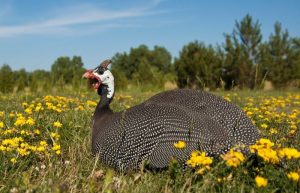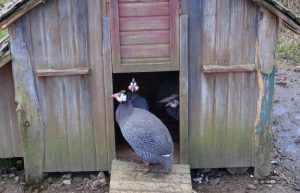
What to Know About Guinea Fowl Needing Coops
Guinea fowl are popular poultry usually chosen as alert birds for other farm animals or as a low-maintenance alternative to chickens. What most people know about guinea fowl is that these are mostly free-range birds; this means that this poultry tends to thrive in open areas where they can move freely compared to chickens who are fine living in an enclosure. As free-range birds, you may be wondering whether you’ll need to provide a coop if you plan on getting guinea fowl.
Do guinea fowl need a coop? Guinea fowl don’t require a coop since they tend to roost above the ground, like in trees and barn rafters. However, you can provide a coop or shelter for your guineas to give them a place of security and protection. It can be hard to catch guinea fowl and get them to go in a coop, so it’s best to provide them with an option of shelter and let them choose whether they rather stay out or go in for the night.
While guinea fowl are low-maintenance, it can be challenging to figure out how to keep them safe from predators and the elements while also allowing them to wander wherever they want to go. To learn more about taking care of these free-range birds, keep reading!
Things to Know About Guinea Fowl When It Comes to Keeping Them in Coops
Guinea Fowl are unique birds that can be quite different than chickens. If you plan on adding guinea fowl to your farm, you should take the time to research and learn about how these birds live and function. The below points can help you have a better understanding of the behavior of these birds and the steps you need to take to properly care for them.
Guinea Fowl Are Easy Targets For Predators
Since guinea fowl can fly quite farther and higher than chickens and they’re known to be good alert birds, you may think that these birds could easily avoid predators…NOT! Unfortunately, guineas can easily be picked off by predators, from owls and snakes to dogs and wild cats. (Although, guineas are known to go after snakes as well. You can learn more by reading my article Do Guinea Fowl Kill Snakes? What You Should Know.
Guineas spend their day pecking at the ground looking for bugs and other snacks. They also love to explore and tend to stick to more wooded areas, where they can roost up in the trees. These two behaviors can make them an easy meal for predators. Looking for food on the ground can distract them from being alert and looking for predators. Predators will also stick to the shadows and wooded areas to conceal their presence. This can lead to many run-ins between species.
While you may want to allow your guineas to stay out at night and roost where they want, this makes it inevitable that some will eventually be snatched by predators. Most predators hunt at night and could easily target your guinea fowl. Providing your guineas with a secure roosting space can help them stay safe at night.
A Smart Guinea Fowl Will Choose a Safe Place to Roost
When it comes to guinea fowl, the term “only the smart survive” definitely applies. Not all guineas have the knack for survival as others. That being said, a smart guinea will naturally choose a secure place to roost at night while a not-so-smart one may stick to the outdoors.
We once had ten guinea fowl that roamed free-range around the property. A few weeks in, every guinea had been grabbed by a predator or disappeared, except for one. The one that survived figured that roosting in the barn rafters was safer than roosting outside in the trees.
With all this in mind, it’s a good idea to provide a coop as an option to your guinea fowl. The smart guineas may realize that roosting in the coop will keep them safer at night compared to staying outside. A smart guinea will naturally be drawn to a secure and closed off space compared to staying out in the open where they are more vulnerable to predators.
Did you know that ducks are another type of poultry that won’t naturally choose a coop? You can learn more about this in my article Do Ducks Need a Coop: What You Need to Know.
Guinea Fowl Will Stick With Other Animals For Safety
 If you have chickens, you may not have to provide another coop for your guineas. Guinea fowl will often go and roost in chicken coops with the chickens in there! Smart guineas learn to stay with other animals and poultry, as bigger numbers can keep them safer. Guinea fowl rather be in a group than be solitary, and will stick with other animals, even if they aren’t the same species.
If you have chickens, you may not have to provide another coop for your guineas. Guinea fowl will often go and roost in chicken coops with the chickens in there! Smart guineas learn to stay with other animals and poultry, as bigger numbers can keep them safer. Guinea fowl rather be in a group than be solitary, and will stick with other animals, even if they aren’t the same species.
We had a guinea fowl that lived out almost exclusively with our horses. When the horses would go in the run-in shed, the guinea would go in there with them. At night, the guinea would sleep in the barn rafters above the horses. This was the same single guinea that had survived while the rest had been eaten by predators.
Guinea Fowl tend to either stick together or stick around other animals for safety. If your animals congregate in a barn at night, the guinea fowl may be more likely to go in there as well. Likewise, if guinea fowl see chickens going into a coop at night, they may try to roost in there with them.
You Can Train a Guinea to Sleep in a Coop
Guinea fowl are wonderers by instinct; they wander from place to place looking for food and exploring while chickens tend to stay on their own turf. It’s not unheard of for guinea fowl to wander off and never come home, as they can be quite sufficient on their own.
That being said, you can train guineas to sleep in a coop and return home each night. The best way to do this is by raising guinea fowl from babies, which are called keets. You raise keets much as you raise chickens; they’ll start out under a heat lamp and in an enclosed space, then once they are old enough, you can move them outside to an enclosure with a coop.
When the guinea fowl are old enough to be released from their enclosure, it’s important that you don’t turn them loose all at once; otherwise, they’ll probably all wander off and you’ll never see them again. Remember, guinea fowl like to stay in a group. If you release one at a time, they will stay closer to the pen where the other guineas are.
By providing the guineas will plenty of food and water in their enclosure or coop and gradually giving them more time and freedom to roam, you can train your guineas to come back to the coop each night.
Guinea Fowl May Prefer a Barn to a Coop
If you have a barn, you shouldn’t rule out the possibility that your guinea fowl may prefer the barn to the coop. Barns can provide accessibility to the guineas while also enabling them to roost off the ground in rafters or ontop of stall doors. If other animals are in the barn, the guinea fowl may feel more comfortable and safe in a social environment rather than being separated and kept in a coop.
If you want to collect eggs from your guineas and be able to easily catch them, then you should keep them in a coop. Coops provide a confined space where you can grab guineas you plan on selling or that need medical attention. You can also easily collect eggs in a coop. If you want guineas to use as alert birds and to simply have around, then the birds may be better off given access to the barn.
For other shelter ideas for your guinea fowl, you can also use a tall chicken run with access from above, tree houses, big birdhouses, and even a calf hutch or a cow igloo. Guinea fowl can fly quite high, so you can provide access points higher up on shelters that would prevent predators from getting in but would enable the guineas to fly in. You can also use chicken wire to secure the shelters and deter predators even further.
Frequently Asked Questions:
Can You Keep Guinea Fowl With Chickens?
You can keep guinea fowl with chickens, and the poultry can learn to co-exist. In some instances, guinea fowl may be known to bully chickens, but if you integrate the two species early on as chicks and keets, you will have more success at a tolerable flock. Guinea fowl and chickens can also eat the same things and stay in the same coop, so integrating your poultry can be a great choice!
Do Guinea Fowl Lay Eggs?
Guinea fowl will lay eggs almost daily from Spring to Autumn, but usually don’t lay eggs in the winter. If you want to be able to collect the eggs from your guinea fowl, it’s best to keep your guineas in a coop at night. Most poultry lay their eggs at night, and this will give you the ability to collect the eggs in the morning.
Want to read more about poultry? Check out the articles below!
